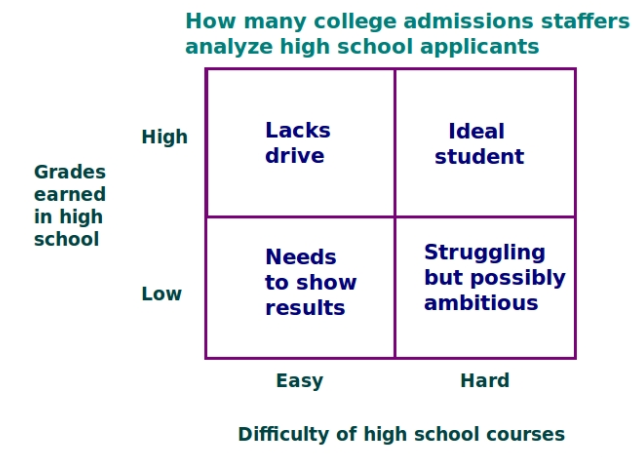Why We Should Eliminate Weighted GPAs
What grades and vigor of classes supposedly show about students.
The weighted grading system. It’s the reason why American students strain themselves towards AP and Honors classes and research shows that it is not only ineffective in the college application process but it is also ineffective in the actual teaching of students at an advanced level.
One argument that is being made is that the weighted grading system discourages students from potentially taking classes that interest them due to the class not being offered at an advanced placement or honors level. Not only does this stump students from pursuing their interests, but it may not give colleges a clear representation of their strengths or what path they want to take in life (College Vine).
Say a student at Madison High School has a passion for digital design but fears to take regularly weighted classes such as Yearbook or Digital Design in the place of AP classes that he or she may not be as passionate about, this will then impede the student from further pursuing an interest that he or she may have excelled in. However, one could argue that one could use the pass/fail system to eliminate the weight of elective classes altogether, but this then can detract the importance of these classes in the student’s mind even if the student is passionate about the subject matter. For example, if a student takes Global Marketing pass/fail but knows that he or she has an AP Statistics test next period, the student will naturally feel that the AP Statistics is more important to bring his or her focus to than the pass/fail Global Marketing class. However, if the weighted grading system is eliminated, all classes will matter equally and students will be obliged to give the same amount of attention to all classes, no matter its difficulty.
In a way, this can educate the students in a better manner because instead of wiring students to prioritize one class over another, students will be wired to give importance to all the subjects they learn in school, which will then give them more of a well-rounded education. Furthermore, the weighted grading system will allow students to view school more as a meritocracy than a learning environment. Students tend to take classes and perform in classes for the purpose of the grade and not for the knowledge, and the weighted grading system can feed this mentality that the more “As” and “Bs” you have in AP and Honors classes, the higher your class rank will be, thus making secondary education more of a numbers game then it already is.
In 2015, a high school in California, Henry M Gunn. School, had tried to decide whether the administration should solely report weighted grades on transcripts rather than both unweighted and weighted grades. There are pros to weighted grades, like that they invariably acknowledge the rigor of classes the student attempt to put work in which will directly show colleges such, but there are still huge cons to the situation. The weighted grading system may be encouraging students to stretch themselves too thin when it comes to stress and rigor of classes, which will then cause students to take AP/Honors for all the wrong reasons of which include class rank climbing, and vigorous GPA climbing. This can then proceed the students to have issues with mental health and stress management (The Campanile).
There is also the argument that grades themselves are an obsolete way of communicating a student’s potential, because of the fact that grades promote the act of working more than learning and that they are blind to all parties (educators, students, parents) of what the point of school actually is – to learn (Huffington Post). Many are forgetting that the point of high school is more than just having a gateway to college acceptance, its’ purpose is to also for students to get a comprehensive and well-rounded secondary education. Furthermore, students and parents alike should remember that a “good” education will be different and depend on the individual. The reality is that not every student is AP/Honors material, but we should stop coining that as a bad thing and adults should start telling students that a number doesn’t gauge intelligence, and more importantly, it doesn’t measure individual worth. With regards to this, weighted GPAs indicate the opposite, in that the level of intelligence and the vigor of the classes one takes numerically puts that individual of a higher standing than someone who is just as smart but may not have the same knack for books as the AP/Honors kids.

